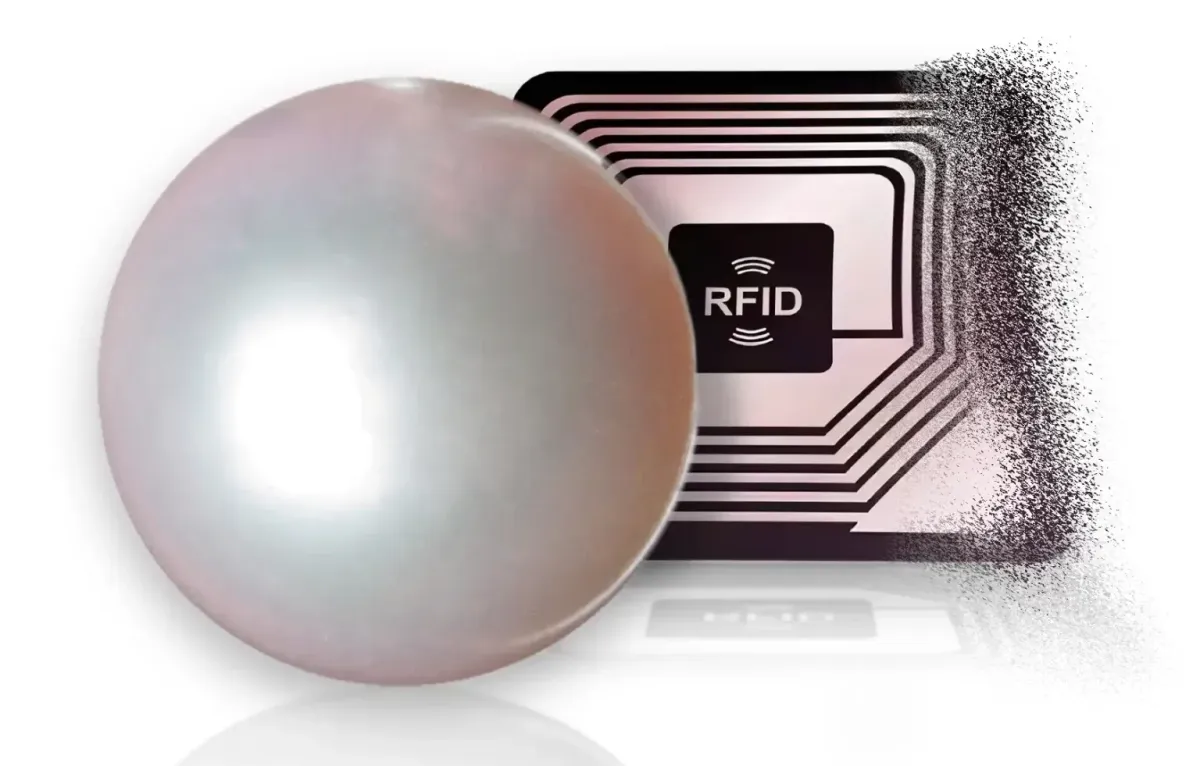
RFID in Akoya Pearls: Traceability, Usage, and Implications
RFID in Akoya Pearls: Traceability, Usage, and Implications by Fukui Shell Nucleus Factory, Hong Kong

Metakaku® illustration: RFID chip embedded within pearl nucleus (Source: The Culture of Pearls).

IA Cultured Pearl Report with RFID reference, pearl, and reader device (Source: GIA/National Jeweler).
This post summarizes the use of RFID technology in Akoya pearls, focusing on Fukui Shell Nucleus Factory’s Metakaku® bead nucleus with embedded RFID chips, and its adoption by GIA for cultured pearl reporting.
Who’s Doing It and Where to See It
Fukui Shell Nucleus Factory (Metakaku®): Inventor/supplier of RFID-enabled bead nuclei for Akoya, South Sea, and Tahitian cultured pearls. Website: https://www.fukuiglobal.com
GIA (Gemological Institute of America): Since Sept 2024, GIA reports for pearls containing an RFID bead nucleus include the unique RFID reference number. Press release: https://www.gia.edu/gia-news-research/gia-cultured-pearl-report-includes-rfid
GIA Gems & Gemology Lab Notes: Technical reports with X-ray images of RFID devices in pearls. https://www.gia.edu/gems-gemology
Metakaku® retail example: Consumer listing of an RFID-tagged pearl with a GIA report. https://www.jewelrynavigators.com/metakaku-pearl-example
Industry coverage (National Jeweler): https://nationaljeweler.com/articles/12516-gia-now-reports-on-rfid-enabled-pearls
How It Works in Sourcing & Production
Bead nucleus manufacture – Fukui bonds a micro-RFID to the shell bead nucleus (patent literature exists) and supplies it to farms. RFID JOURNALGoogle Patents
Seeding – Farmers implant that RFID nucleus into the oyster (Akoya, etc.) exactly like a normal bead-nucleated pearl. The tag becomes the pearl’s built-in ID. RFID JOURNAL
Grow-out & harvest – At harvest, the farm (or buyer) can scan the pearl with a compatible reader to pull the unique ID and linked data (farm, date, batch, location). Some early deployments focused on pearls ≥ ~9 mm, though the program now spans Akoya and larger saltwater types. RFID JOURNALnationaljeweler.com
Trading & lab – When sent to GIA, the lab reads the RFID and adds the number to the Cultured Pearl Report, tying the physical pearl to report + value factors. GIA
Retail & after-sales – Sellers can show the report (and, where available, a digital record). During setting, drillers are advised to avoid the chip; in practice the device is positioned off-center to reduce drill-through risk. GIA
What It Means for Jewelry
Benefits
Provenance you can prove – Verifiable farm/batch origin for Akoya and other bead-nucleated pearls; reduces mislabeling (e.g., origin claims) and boosts consumer trust. nationaljeweler.com
Anti-fraud & resale confidence – A unique, hidden ID helps with theft recovery, warranty, buy-back and auction verification. Labs can confirm the same physical pearl later. GIA
Operational visibility – Farms, processors and brands can log handling events (harvest dates, treatments, shipments) against a single pearl ID for QA and ESG reporting. RFID JOURNAL
Marketing & storytelling – Photos/X-rays and report tie-ins create a compelling provenance story at POS. (See GIA images/X-rays above.) GIA
Considerations
Size & adoption – Early reports noted practicality from ~9 mm up; tiny Akoya may pose constraints until chips miniaturize further. Expect fastest adoption in larger Akoya/saltwater categories first. RFID JOURNAL
Workshop awareness – Jewelers must know where the chip sits before drilling/setting. Labs note the chip doesn’t affect appearance; placement aims to avoid drill paths. GIA
Readers & data access – A specific RFID reader and database access are needed; standardizing readers/workflows across the trade is still a work in progress. GIA
Concrete Use Cases
GIA’s official announcement (policy + example photo with pearl, reader, and report). GIA
National Jeweler coverage (plain-English summary and images). nationaljeweler.com
Gems & Gemology lab note (deep dive; X-ray images of the RFID device inside pearls). GIA
Metakaku® explainer (industry blog walkthrough, helpful for staff training). The Culture of Pearls
Fukui company site (supplier background; contact). fukuishell.com
Retail listing of a Metakaku-tagged pearl with GIA report (consumer-facing presentation).
Beyond Pearls
RFID/NFC micro-chips in finished jewels – e.g., Singapore atelier Caratell embeds tiny chips in high jewelry for identification and after-sales tracking. (Good benchmark for how chips can live in finished pieces.) Katerina Perez